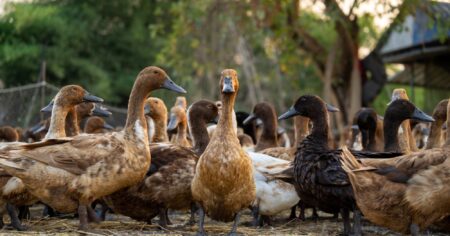By Cami Koons
AMES — National Farmers Union President Rob Larew spoke about the stalled reauthorization of the Farm Bill and strategies to promote agriculture and conservation within the upcoming administration Saturday at the Iowa Farmers Union annual conference.
“I am so tired of talking about this farm bill,” Larew said with a laugh to a full conference room at the Quality Inn in Ames.
The Farm Bill is a bipartisan package of legislation, typically reauthorized every five years, regulating and funding food and farm programs from the U.S. Department of Agriculture conservation initiatives to the Supplemental Nutrition Assistance Program. The 2018 Farm Bill, however, was extended in 2023, expired in fall 2024 and awaits an unknown fate in the rapidly approaching close to the congressional lame-duck session.
Larew said coming into 2023, the attitude with the Farm Bill was to take what happened in the pandemic and craft better provisions to protect farmers and the U.S. food system.
“And then nothing happened,” Larew said, and detailed how perspectives changed as Farm Bill deadlines came and went.
“Now we are where we are, which is very likely another extension, pushing us into a lot of uncertainty for next year,” Larew said.
The reelected Farmers Union president said a Farm Bill is hard to pass in a normal year, let alone in a year when the legislation is “low on the list” of a new administration’s priorities.
Larew said he hopes the president-elect’s plans to slash government spending does not impact the Farm Bill, and said he will continue to push the message that “you can never balance a budget on the back of a Farm Bill.”
Larew spoke as part of the “Farm Bill Limbo” panel at the 2024 convention, titled “Fairness in Farming,” along with DTN Progressive Farmer Ag Policy Editor Chris Clayton and Cheryl Tevis, an ag-focused writer with the Iowa Writers’ Collaborative.
The other panelists expressed similar concerns toward changes to agriculture policy that could come from the upcoming administration, including tariffs, mass deportations, decreasing the abilities of USDA, and the conflicting interests of Robert F. Kennedy, Jr., who is slated to run the Department of Health and Human Services and Brooke Rollins,who Trump plans to nominate as secretary of Agriculture.
Tevis said she’s “not holding (her) breath” that Congress will agree on the “fragile marriage of convenience” that is the Farm Bill before the end of the year.
Before the panel, Iowa Farmers Union members shared stories of their participation in USDA programs, like cover crops subsidies, conservation easements, energy programs that allowed them to update freezers and install solar panels and local food procurement funding.
Shaffer Ridgeway, a union member and vegetable farmer from Waterloo, said many of the specialty crop farmers he speaks with and works with are “just figuring out” how to utilize USDA programs on their smaller-scale farms.
“If you take it away in the next Farm Bill, I think people will be even more skeptical of working with USDA,” Ridgeway said.
At the State Level
Iowa Farmers Union President Aaron Lehman opened the Saturday sessions with an overview of the union’s accomplishments in 2024, including another year of membership growth consistent with what the union has seen over the past 12 years.
Lehman commended union staff and members for their organized opposition to the sale of a nitrogen fertilizer plant to Koch Industries in the spring, a successful Farmers Union Day at the state fair and continued efforts to promote local food and conservation.
Cami Koons/Iowa Capital Dispatch
Lehman also highlighted the union’s efforts to oppose a lawsuit aimed at dismantling a federal provision that protects wetlands. Iowa Farmers Union, along with Iowa Environmental Council and several other groups, were approved Tuesday as intervenors in the lawsuit over the swampbuster provision.
“We are responsible for those things being put into law,” Lehman said. “The Department of Justice and the USDA should be defending themselves when they are challenged … but it’s important for us to be there at the table too, because we’re not sure where this new administration will defend themselves.”
Lehman championed union efforts at the Statehouse to secure “the first ever state-funded procurement of local food” which was accomplished in collaboration with the Iowa Food System Coalition.
Union members were invited to the local food policy summit on Friday to talk about the work of the Iowa Food System Coalition and 2025 plans to grow the Iowa local food economy.
Lehman said union members can be “proud” that they were “the only farm group opposed to a pesticide liability shield for pesticide companies.” Lehman said the group plans to oppose the Bayer-led bill about pesticide labeling again in 2025.
Lehman said there is much more to be done in the coming year.
“We won’t get it just by working at the Statehouse,” Lehman said. “We have to work together in the countryside. We have to work at it around tables in our communities and on our farms in order to make a real difference from the ground up.”
Iowa Capital Dispatch is part of States Newsroom, a network of news bureaus supported by grants and a coalition of donors as a 501c(3) public charity. Iowa Capital Dispatch maintains editorial independence. Contact Editor Kathie Obradovich for questions: [email protected]. Follow Iowa Capital Dispatch on Facebook and Twitter.


:max_bytes(150000):strip_icc()/Chore-TimeCENTROControlIMG_4872-ol-adj-c680cb83ec304a96ba9da3236b0368a5.png)
:max_bytes(150000):strip_icc()/broiler-house-USDA-chickens-33f03f426d784813b851457dd8df4ffe.jpg)
:max_bytes(150000):strip_icc()/ExactEmerge20planter2-2-2000-ff0d96657bcf4f64a743b3ce75b7d8bb.jpg)


:max_bytes(150000):strip_icc()/panelists-speak-about-the-farm-bill-at-the-iowa-farmers-union-annual-conference-from-left-are-cheryl-tevis-rob-larew-and-chris-clayton-photo-by-cami-koons-iowa-capital-dispatch-071549d6ef274ac18c10d00a83cc8948.jpg)


:max_bytes(150000):strip_icc()/7020578JJGouin-1398010459_Getty-c2c22ce272c34612bb35c550a0925cbf.jpg)